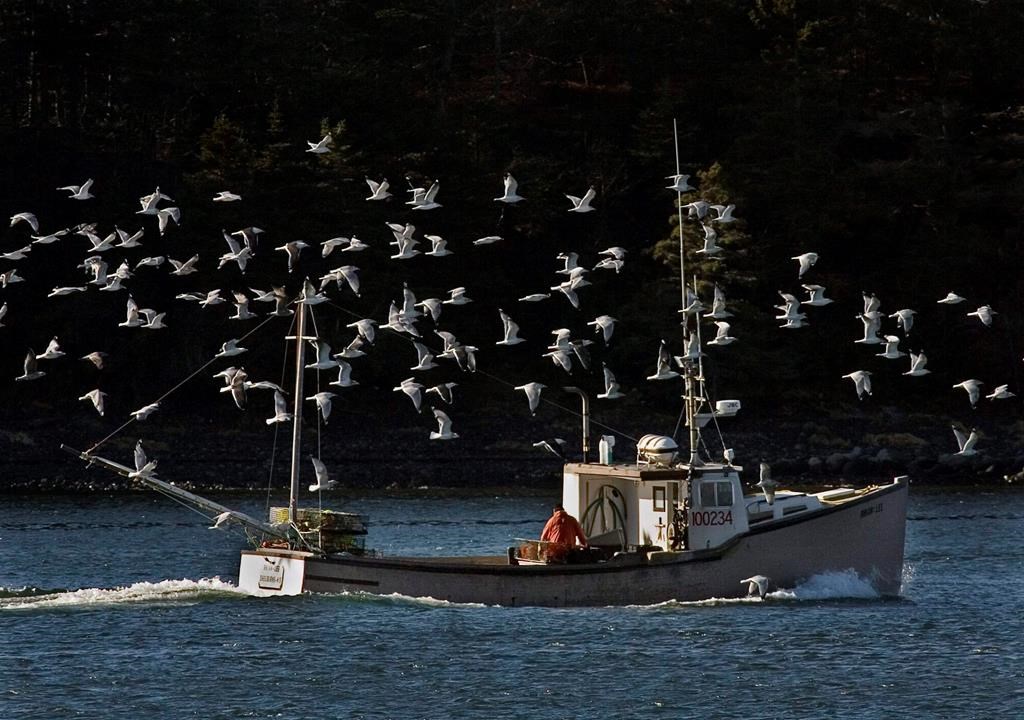An Indigenous community in eastern Quebec has signed a five-year agreement with Ottawa to develop a collaborative approach to governing the band’s fisheries.

The federal Fisheries Department issued a statement Sunday saying the Rights Reconciliation Agreement on Fisheries represents a “starting point for discussions” with the Listuguj First Nation.
Fisheries Minister Bernadette Jordan said the agreement upholds the treaty rights of Mi’kmaq First Nations to harvest and sell fish in pursuit of a moderate livelihood.
The minister said the agreement could help the band achieve economic self-reliance by enabling band members to obtain more fishing licences, as well as more boats and gear.
The Mi’kmaq community is just across the Restigouche River from Campbellton, N.B.
READ MORE: Federal fisheries committee talks First Nations law, moderate livelihood, systemic racism
The chief of Listuguj First Nation, Darcy Gray, issued a statement saying the agreement “marks a new chapter” in the band’s relationship with the Crown.
“Canada has finally acknowledged that Listuguj has authority over our rights and our fishery and that we use our own Indigenous laws in exercising that authority,” Gray said.
“We will now be able to collaborate with Canada on a government-to-government basis to ensure that our fisheries are safe, sustainable and contribute to our community for generations to come.” Gray could not be immediately reached for an interview Monday.

Get daily National news
Jordan said the agreement recognizes that the Mi’kmaq have fished the Atlantic shores for centuries.
“With this agreement, Canada and Listuguj Mi’kmaq First Nation will work together to see that right manifest in a productive, sustainable fishery that will bring greater stability, opportunity, and prosperity to the Listuguj people and the local communities,” Jordan said in Sunday’s statement.
“It demonstrates true partnership between our nations, achieved through the spirit of reconciliation.”
The Listuguj band started negotiating the reconciliation agreement with Ottawa after a framework for talks was established in November 2018.
In 2019, Fisheries and Oceans Canada signed two 10-year Rights Reconciliation Agreements with the Elsipogtog (Big Cove) and Esgenoopetitj (Burnt Church) First Nations in New Brunswick, and the Maliseet of Viger First Nation in Quebec.
Listuguj, like other Mi’kmaq communities in Quebec, has a treaty right to hunt, fish, and gather for a “moderate livelihood,” as confirmed by a Supreme Court of Canada ruling in September 1999 known as the Marshall decision.
Two months after that decision was released, the Supreme Court provided a clarification that remains at the heart of on ongoing dispute in Nova Scotia.
The court stated that the treaty rights cited in the first decision were not unlimited, and the Indigenous fisheries could be regulated by Ottawa to ensure conservation of fisheries resources.

That caveat is often cited by non-Indigenous commercial fishermen who say they would have no problem with a separate, Indigenous commercial lobster fishery, so long as it complied with federal regulations.
When the Sipekne’katik First Nation in Nova Scotia launched its self-regulated moderate livelihood lobster fishery on St. Marys Bay on Sept. 17, 2020, the federally regulated fishing season was closed.
That move sparked a series of protests, violence and arrests in southwestern Nova Scotia.
Last month, Jordan released a plan outlining conditions for Indigenous lobster fishers to participate in the moderate livelihood fishery, but it was immediately panned by the Assembly of Nova Scotia Mi’kmaq Chiefs.
Jordan said her plan would allow moderate livelihood fishing during the commercial, federally regulated season. The plan would also allow First Nations communities to sell moderate livelihood catches to processors, which is currently illegal under Nova Scotia regulations.
The chiefs said the plan was unacceptable because the federal government was asserting unilateral control “over our rights-based fishery.”
- Michael Kovrig reflects on ‘brutally hard’ Chinese detention: ‘You’re totally alone’
- TD Bank moves to seize home of Russian-Canadian jailed for smuggling tech to Kremlin
- U.S. moves to ban Chinese software, hardware from all vehicles in America
- Conservatives set to table non-confidence motion Tuesday. What to expect







Comments